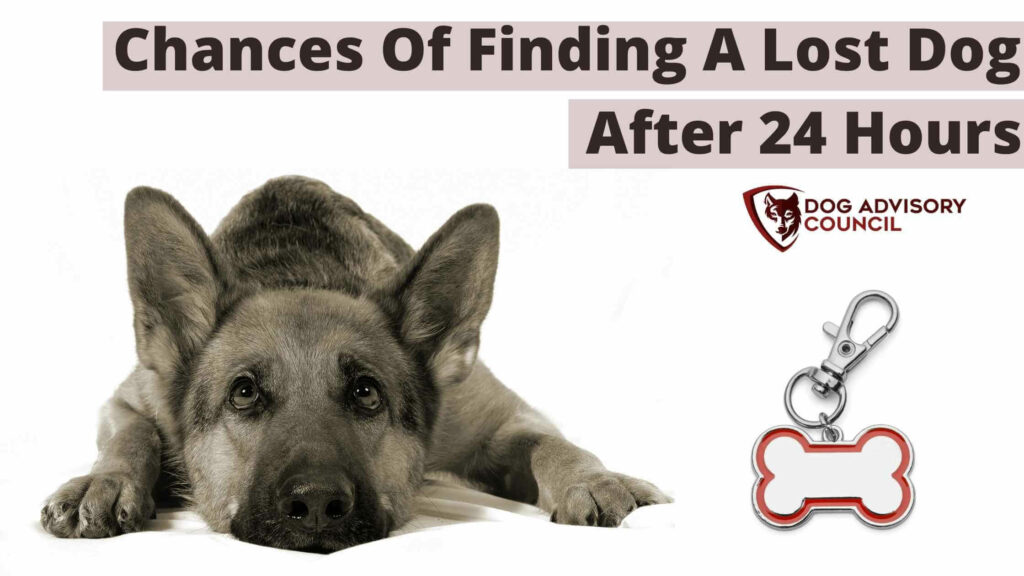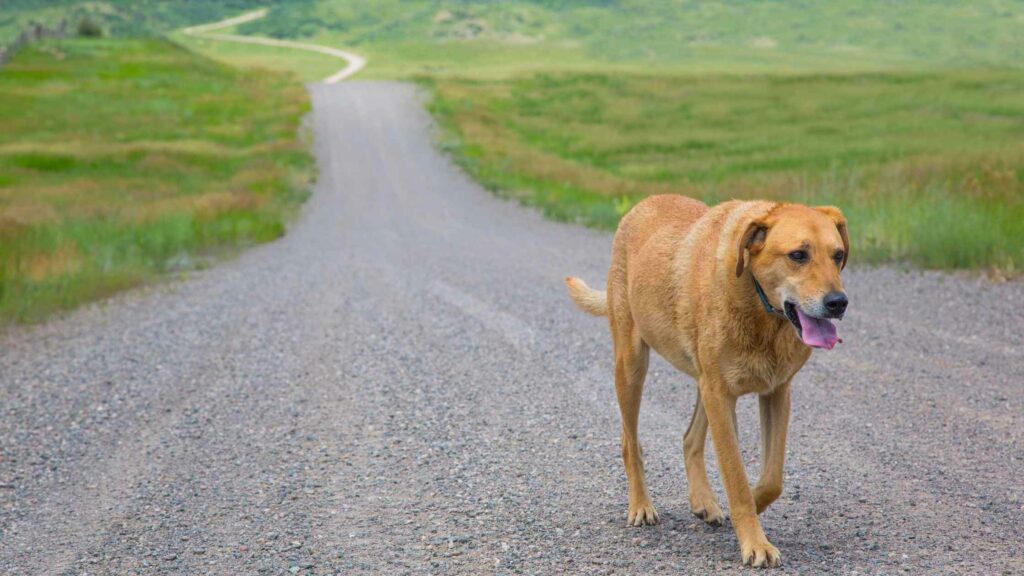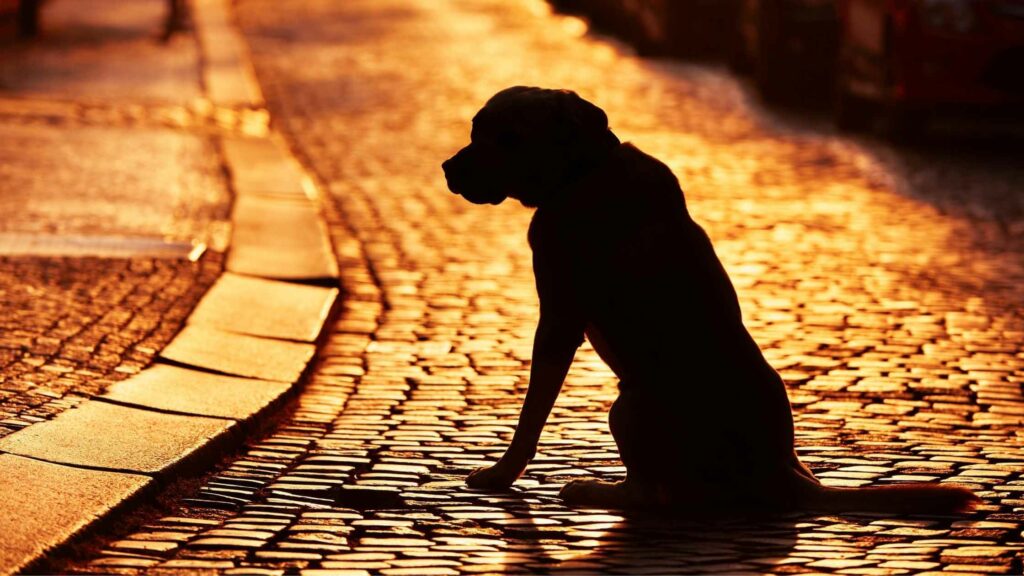
If you have a lost dog, finding him is your first priority. Here are the chances of finding a lost dog after 24 hours and all the information you’ll need to get him home as quickly as possible, including the importance of timing.
Within the first 24 hours of your dog being marked as “lost,” the chances of finding them are as high as 93%. After that 24-hour mark, however, the chance of finding your dog drops to 60%. You can help keep your odds as high as possible by understanding where dogs go, how they need to be lured back, and organizing a logical search party. We’ve got all of that waiting for you below!
What is the average time a dog is lost?
In many cases, dogs are missing for around 30 days. Some can be much shorter, and others can be much longer. As we’ll discuss, the chances of finding your dog vary, but the average time will be a month.
What is the probability of finding a lost dog?
Happily, the chances of finding a lost dog are a reassuring 90%! When looking to keep those odds as high as possible, you’ll want to spend time and energy focusing on putting every action and possibility you have into place.
What are the chances of a dog finding its way home?
Some dogs do find their own way home, which often surprises owners. The probability of that happening is 16%, which often depends on how far your dog has gone from your home and why they left in the first place. It also depends on the weather and other environmental factors.
Can a lost dog find its way back home?
As the probability above explains, yes. However, it’s not a good idea to assume that your dog will find its way home. You must also search for your dog so that your odds of finding and bringing them home are as high as possible.
How far away can a dog smell his home?
As you may already know, dogs have impressive and powerful senses of smell. Dogs can smell up to 12 miles (20 km) in perfect conditions. This number is surprising, of course, but remember that it says “perfect conditions” for a reason!
The weather must be warm and dry; there must be a strong wind directing from your house to the dog’s nose. And your dog must be paying attention and/or searching for the sent.
So, you’ll want to assume that the actual, logical distance is much lower.
Where do dogs go when they go missing?
Dogs will start acting on their instincts when they go missing. Their priorities will be safety, water, and food. They’ll focus their attention on finding all of those things.
If there is a place nearby your home with all those things, and your dog knows that, this is a logical place for them to go. They might be nearby but hiding when they hear people approach.
Dog behavior after being lost: what to expect
Being lost is just as terrifying for your dog as it is for you. Once they realize that they aren’t home and can’t find their way back there, anxiety will set in.
Dogs will fear being too far from their pack. This will lead them to hide away for a while until they can decide what to do next, or it might lead them to search out something familiar. For example, a dog park they like or a neighbor’s house they can find their way to. They’ll be searching for a place that is safe and familiar until you, their pack, can find them.
After a while, their instincts will kick in, and they’ll start looking for food, water, and shelter. This might be close to the original safe space, or it might be elsewhere.
How far can a dog travel in a day?
A medium-sized dog can travel up to 15 miles (24 km) daily. Smaller dogs will travel less, and so will older or ill dogs. Larger dogs can travel further, of course.
Just because your dog can travel that far doesn’t mean they will. In fact, many dogs don’t travel very far from their home or loss site unless chased.
Do dogs get scared when they get lost?
Yes, dogs will get scared when they realize that they’re lost. They want nothing more to be with their pack, so being apart from you will make them anxious and fearful. This is especially if they can’t figure out how to get back.

How do you attract a lost dog home?
If your dog is lost, you’ll obviously want to do everything in your power to bring him home as soon as possible. So, let’s take a detailed look at just what you can do to attract them home. This, combined with your own searching, will keep those odds as high as possible, right?
- Put their bed outside
- Put your clothing or bedding outside
- Call their name in a friendly voice
- Shake the treat can
Put their bed outside
As we mentioned above, dogs have a powerful sense of smell. Put their bed or blankets, etc., outside of your home so they can catch a scent of it if they are in the area. This comforting and safe smell will often lead them to come home. They may hide close by and take a look at their bed to see if anyone appears to be using it. If not, they may just crawl in and enjoy a much-needed snooze.
Put your clothing or bedding outside
You’ll also want to consider putting your clothing or bedding outside, too! Your dog may be just as drawn in by your smell as they are by the smell of their own bed. They’ll want to be back to safety and comfort, which means their pack — you.
For best results, you want to combine their bed and your belongings so that they have an extra scent to catch and a reminder of security and safety in both forms!
Call their name in a friendly voice
Your dog will pick up on your anxiety, leading to more anxiety for them. They may even interpret it as them being in trouble, so they’ll stay hidden rather than respond. So, as much as possible, try to call to your dog in a friendly and exciting voice. The happier you are with your voice, the more likely they will respond to you if they are within hearing distance.
Shake the treat can
All pets respond to the shaking of the treat can, right? Their treat can will sound familiar to them, which will get their attention, but not other animals. Since dogs often love treats more than life, it can instantly bring them to you.
How do dogs survive when they get lost?
Dogs are impressively powerful creatures that have the potential to survive on their own when they get lost. This is thanks to their biological instinct that kicks in when they start to feel hunger and a need for safety when they’re on their own.
Once they find food, water, and shelter, they can survive for months or years on their own. This is a reason to have hope since it means you still have every opportunity to find your dog!
What to do in the first 24 hours after your dog has been lost
Once you realize that your dog is missing, time will be of the essence, as we mentioned earlier. Consider this your guide to getting your dog back home as soon as possible:
- Get the word out about your missing dog
- Contact the authorities
- Organize a local search
- Be strategic and logical
- Stay positive
Get the word out about your missing dog
As soon as you notice that your dog is missing, tell everyone that can possibly help. This includes neighbors, friends, family members, and more. The more (local) people that know, the more that can be ready to jump in and help you when you’re ready to organize a search party.
In this case, we’re talking about the animal-related authorities! This includes SPCAs, vet hospitals, and any local animal rescues that will be able to let you know if they get any phone calls about sightings or even if someone brings your pet in. Ensure you give them accurate descriptions and let them know if they are microchipped.
Organize a local search
Now that you’ve let everyone know, you can organize a search party. You’ll want to start local to your house. Bring together people who know your dog or those you trust to help you out, and have them organize a grid-like search by calling your dog’s name. The sooner after realizing that your dog is missing, the better. Your dog still might be nearby enough to hear your party calling its name!
Be strategic and logical
From notifying people to organizing a search to picking designated spots to visit, be strategic in organizing the search party for your dog so that you’re actually
effective in bringing him home. It’s normal for panic and worry to set in, of course, but do your best to remember that staying focused means that you’re most likely to bring your dog home sooner rather than later!
Stay positive
It’s easy to despair when you can’t find your dog, or you do find your dog, and it’s hard to capture them (more on that below), Stay calm and positive, and remember that those percentage numbers are high enough that you should stay positive!

What to do if I find my dog
If you are lucky to find your dog or someone in your party does, the most important thing to do is focus on how to get your dog physically under your control. This is much harder than many assume since they don’t see why their dog should avoid them or run away.
So, let’s take a moment to think about it from your dog’s point of view. They are confused, scared, and hungry, and suddenly everyone is yelling their name. They may feel as though they are in trouble. They also might just be overstimulated and overwhelmed.
When you approach your dog, do so obviously and slowly. Leave lots of space between you and them, especially if they are obviously nervous. Use a positive and calm, warm voice to call the name. Say things like “Hi pretty girl” or “How’s my handsome boy?” This will help them detect your loving and happy tone rather than your angry or stressed one.
Use a toy or a treat to lure them to you. Don’t chase them yourself, ever. It will scare them away and make it harder the next time someone tries to approach them.
When they get to you, pet them and give them ear rubs, hugs, etc. Again, move slowly and obviously. If your dog backs off, allow them to simply approach you and stand there until they are okay with you petting them.
As you give them positive attention, carefully clip a leash on them, then use the same cheerful tones and focus on getting them into the car, etc. They may resist when they realize they’ve been captured, so focus on being positive and calming. If your dog is actively struggling against you, stay calm and don’t force them to move. Give them love and attention to assure them that everything is okay.
When to stop looking for a lost dog
Never! Think about the times you’ve heard of dogs returning home years after going missing. There’s no such thing as too long for a dog to return home after going missing.
Conclusion
If your dog has gone missing, you have high hopes and odds of finding them, especially at first.
You can have a 93% chance of finding your dog within its first 24 hours of being missing. After the first 24 hours have passed, that drops to 60%. However, you can still find your dog if you know what to focus on, where to look, and how to approach the dog once you’ve found then.
Make sure you are fully equipped to help bring your dog home by knowing what to do — and most importantly — what not to do.
Know someone who worries about this, or even someone in this panicky situation right now? Share this with them and help calm them done!
